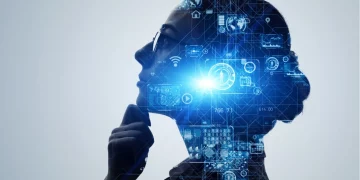Human consciousness has long been a subject of intrigue and mystery. For centuries, philosophers, scientists, and artists have sought to understand the nature, scope, and limits of consciousness—those enigmatic moments when we are fully aware of our thoughts, feelings, and perceptions. Yet, despite our many advances in neuroscience, psychology, and philosophy, the horizon of human consciousness remains largely uncharted, with vast swaths of the human experience still waiting to be explored.
In this article, we will explore the uncharted territory of human consciousness, delving into its origins, its current frontiers, and the possibilities that lie beyond the horizon. Along the way, we will ask profound questions about the very nature of awareness, selfhood, and existence. Are we truly the masters of our own minds, or is our consciousness a complex and mysterious force beyond our full comprehension? Let’s embark on a journey to explore the vast, uncharted landscape of human consciousness.
The Origins of Consciousness: A Historical Overview
The quest to understand human consciousness began with the ancient philosophers. For thinkers like Plato and Aristotle, consciousness was closely tied to the soul. They saw human awareness as a reflection of divine intelligence or as an integral part of the natural world. These early reflections laid the groundwork for future inquiries into the nature of the mind, though they lacked the empirical tools we possess today.
The philosophical questions about consciousness continued to evolve, especially with the advent of the Enlightenment and the rise of modern science. René Descartes, often regarded as the father of modern philosophy, famously declared, “Cogito, ergo sum” (I think, therefore I am). In this statement, Descartes linked consciousness directly to the self-awareness of thought. His dualism—the idea that the mind and body are separate—dominated Western thought for centuries, though it would later be challenged by new scientific insights.
The 19th and 20th centuries brought revolutionary changes to the study of consciousness. Advances in psychology, notably through the work of Sigmund Freud, William James, and later, cognitive scientists like John Searle, brought a more empirical approach to understanding the mind. Freud’s exploration of the unconscious mind and the development of psychoanalysis introduced the idea that much of our mental life exists beyond conscious awareness. William James, in his influential work The Principles of Psychology, famously described consciousness as a “stream” that continuously flows and changes, a dynamic and fluid process rather than a static state.
Mapping the Terrain: Modern Science Meets Consciousness
Today, consciousness is studied across various disciplines, from neuroscience to cognitive psychology, artificial intelligence, and quantum physics. Each field offers its own perspective on what consciousness is, how it arises, and what its limits may be.

Neuroscience: The Brain and the Mind
Neuroscience has made remarkable strides in mapping the brain’s structures and understanding how they contribute to our conscious experience. Technologies such as functional magnetic resonance imaging (fMRI) and electroencephalography (EEG) allow scientists to observe brain activity in real-time, providing insights into how different regions of the brain are involved in perception, attention, memory, and decision-making.
At the heart of the neuroscientific study of consciousness lies the “hard problem” coined by philosopher David Chalmers. The hard problem asks: Why and how does brain activity give rise to subjective experience? While neuroscientists can identify the brain regions associated with certain mental processes (for example, the occipital lobe for visual processing), they have yet to explain how these processes create the rich, subjective world of experience that each of us perceives.
One leading theory, known as the “Integrated Information Theory” (IIT), suggests that consciousness arises from the integration of information across the brain’s neural networks. According to IIT, consciousness is not localized in any one part of the brain but is the result of the complex interactions between various regions that process information in a unified manner. However, while this theory has gained traction, it has not yet answered the deeper question of why the integration of information should lead to awareness.
Cognitive Psychology: Consciousness as a Mental Process
In the realm of cognitive psychology, consciousness is often viewed as a mental process that allows us to be aware of our thoughts and surroundings. Cognitive scientists study the mechanisms that underlie our conscious experiences, seeking to explain how we can pay attention, focus, and become aware of stimuli in our environment.
One influential theory in this domain is the “Global Workspace Theory” (GWT), which posits that consciousness arises when information is made globally available to various cognitive processes, including memory, attention, and decision-making. According to this model, conscious awareness emerges when information is broadcasted across the brain’s networks, allowing us to act on that information in a flexible and goal-directed way.
However, this theory, like others, struggles to explain why some mental processes remain unconscious, even when they are available to the brain’s networks. For example, we can process vast amounts of information, such as language or facial expressions, without being consciously aware of every detail.
The Uncharted Territory: Exploring the Limits of Consciousness
While much progress has been made in understanding the structures and processes that underlie consciousness, the boundaries of human awareness remain a vast unknown. Is there a limit to how much we can comprehend? Can consciousness be expanded or altered in ways that we cannot yet imagine? These questions continue to challenge both scientists and philosophers alike.
The Unconscious Mind: The Hidden Depths of Awareness
Much of the human experience lies beyond our conscious awareness. The unconscious mind, as explored by Freud and later psychologists, houses memories, desires, and feelings that influence our behavior, even though we are not always aware of them. Contemporary research in cognitive psychology and neuroscience has further deepened our understanding of how unconscious processes govern much of our actions.
Recent studies on implicit biases, for example, show how we can hold prejudices without consciously realizing it. These biases are shaped by the unconscious mind, often as a result of early experiences or societal influences. While we may strive to overcome these biases consciously, they can continue to affect our decisions and perceptions at an unconscious level.
In addition, practices like meditation and mindfulness have led to insights into how we can train the mind to become more aware of unconscious thoughts and feelings. Some research suggests that regular meditation can alter the brain’s structure and function, enhancing self-awareness and emotional regulation. Could it be that by exploring the unconscious mind more deeply, we might unlock new levels of consciousness?

Altered States: Expanding the Mind’s Horizon
Another frontier in the exploration of consciousness lies in altered states of awareness, whether induced by substances like psychedelics, deep meditation, or sensory deprivation. These altered states can offer glimpses into different modes of perception and cognition, revealing the flexibility and plasticity of consciousness.
Psychedelic substances like psilocybin, LSD, and DMT have been studied for their ability to induce profound shifts in consciousness. Research suggests that psychedelics can lead to experiences of ego dissolution, in which the boundaries between self and other dissolve, and individuals report a sense of oneness with the universe. These experiences challenge our traditional understanding of consciousness as something fixed within the individual mind and suggest that consciousness may be more fluid and interconnected than we once believed.
While the therapeutic potential of psychedelics is still being researched, these substances have opened a new window into the possibilities of human consciousness. Could they represent a key to unlocking new dimensions of awareness that lie beyond our current understanding?
The Future of Consciousness: Artificial Intelligence and Beyond
As we venture further into the 21st century, new frontiers are opening up in the study of consciousness, particularly with the rise of artificial intelligence (AI) and the exploration of brain-computer interfaces. Could machines ever develop consciousness? And if so, what does that mean for our understanding of the human mind?
The idea of machine consciousness has been a topic of debate for decades. Some argue that if a machine is capable of processing information in complex ways similar to the human brain, it could, in theory, achieve a form of consciousness. Others, however, assert that consciousness is inherently biological and cannot be replicated in a machine, no matter how advanced its algorithms may be.
As AI continues to develop, the possibility of creating machines with sophisticated, self-aware consciousness raises profound ethical, philosophical, and practical questions. How would we relate to a conscious machine? Would it possess rights, emotions, or subjective experiences? Could AI even become a new form of life?
In addition, brain-computer interfaces (BCIs), which allow direct communication between the brain and external devices, are already changing the way we interact with the world. BCIs could lead to enhanced cognitive abilities, allowing individuals to control machines or even augment their own cognitive processes. Could these technologies lead to new forms of consciousness, where human awareness merges with artificial intelligence or advanced neural networks?
Conclusion: The Horizon Is Just the Beginning
As we explore the horizon of human consciousness, we find that the more we learn, the more questions arise. While we have made remarkable strides in understanding the neural mechanisms behind awareness and the processes that govern our subjective experience, there is still much that remains unexplored.
The future of consciousness research promises to be both exciting and uncertain. Whether we are unlocking the mysteries of the unconscious mind, delving into altered states, or merging our minds with machines, the uncharted territory of human consciousness offers endless possibilities. For now, we can only continue to explore this vast and mysterious frontier, knowing that the horizon is only the beginning.























